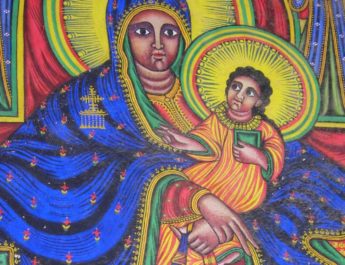Psalm 89:1-8, 14
A Women’s Lectionary 51
A MaskilA of EthanB the Ezrahite.C
A “Maskil” = maskiyl. 13x in OT. From sakal (to consider or be prudent; to instruct, be an expert; dealing prudently, which implies success and prospering; can mean laying cross-wise). This is maskil or maschil. It is a poem used for instruction.
B “Ethan” = Ethan. 8x in OT. From the same as ethan (root might mean to continue; mighty, strong, ever-flowing, enduring, or permanence). This is Ethan, a name meaning “permanence” or “permanent” or “perpetuity” or “perennial” or “firmness.” See https://www.abarim-publications.com/Meaning/Ethan.html
C “Ezrahite” = Ezrachi. 3x in OT. From zarach (to rise, shine, or dawn; can also describe symptoms of leprosy). This is Ezrahite, one whose ancestor is Zerah. It may mean “born of the native” or “son of dawn” or “sprung up” or “of the family of Zerah.” See https://www.abarim-publications.com/Meaning/Ezrahite.html
1 I will singD of your steadfast love,E O Lord,F forever;G
D “sing” = shir. From shir (song, singer). This is to sing. It could also refer to one who is singing or leading others in song.
E “steadfast love” = chesed. From chasad (being good, kind, merciful; may mean bowing one’s neck as is done in the presence of an equal for courtesy’s sake; so, if one in a superior position is treating you like an equal, that is what is captured here). This is favor, goodness, kindness, loving kindness, pity, reproach, or a good deed. When done by God to humanity, this is mercy/loving kindness. When done by humanity to God, it is piety.
F “Lord” = YHVH. From havah (to be, become) or hayah (to come to pass, become, be). This is the name of the God of Israel, the self-existent and eternal one, the tetragrammaton. This pronunciation has been lost to time so “Lord” is generally used in its place.
G “forever” = olam. This is a long scope of time whether in the past (antiquity, ancient time) or in the future (eternal, everlasting).
with my mouthH I will proclaimI your faithfulnessJ to all generations.K
H “mouth” = peh. This is mouth in a literal or figurative sense. So, more literally, it can be beak or jaws. More figuratively, it refers to speech, commands, or promises.
I “proclaim” = yada. This is to know, acknowledge, advise, answer, be aware, be acquainted with. Properly, this is to figure something out by seeing. It includes ideas of observation, recognition, and care about something. It can be used causatively for instruction, designation, and punishment.
J “faithfulness” = emunah. From aman (to believe, endure, fulfill, confirm, support, be faithful, put one’s trust in, be steadfast. Figuratively, this is to be firm, steadfast, or faithful, trusting, believing, being permanent, morally solid). This word is literally firmness, but figuratively fidelity, faithfulness, honesty, responsibility, trust, truth, steadfastness. This word shares a root with the word “Amen.”
K “to all generations” = dor + dor. Literally, “from generation and generation.” From dur (to move in a circle, which implies living somewhere or remaining there; it can also be the sense of piling or heaping up). This is a revolution of time, which is to say, an age or generation. It can also be a dwelling or one’s posterity.
2 I declare that your steadfast love is establishedL forever;
your faithfulness is as firmM as the heavens.N
3 You said, “I have madeO a covenantP with my chosenQ one;
L “established” = banah. This is to build, make, set up, restore, repair, or obtain children. It is to build literally or figuratively.
M “is as firm” = kun. Properly, this means in a perpendicular position. So, it is set up in a literal sense – establish, fix, fasten, prepare. In a figurative sense, it is certainty, to be firm, faithfulness, render sure or prosperous.
N “heavens” = shamayim. Root may mean being lofty. This is sky, the air, or heaven. It is in a dual noun form so this might refer to the part of the sky where the clouds move on the one hand and the part beyond that where the sun, moon, and stars are on the other hand.
O “made” = karat. This is to cut down, cut off, or make a covenant (idiom for making a covenant is “to cut a covenant”). It can also mean to destroy, fail, or consume.
P “covenant” = berit. Perhaps from barah (to eat, choose, make clear); perhaps from bar (grain, wheat); from bara (to select, purify, cleanse, test, brighten, polish). This is a compact, covenant, alliance, treaty, or league.
Q “chosen” = bachir. From bachar (to choose, appoint, try, excellent). This is chosen or choice. So, it implies excellence.
I have swornR to my servantS David:T
R “sworn” = shaba. Perhaps from sheba (seven – the number of perfection/sacred fullness). This is to swear, curse, vow, make a covenant. Properly, it can mean to be complete. This is to seven oneself – as in affirming something so strongly it is as though it were said seven times.
S “servant” = ebed. From abad (to work, serve, compel; any kind of work; used causatively, can mean to enslave or keep in bondage). This is a servant, slave, or bondservant.
T “David” = David. From the same as dod (beloved, love, uncle); the root may mean to boil, which is used figuratively to describe love. So, this implies someone you love such as a friend, a lover, or a close family member like an uncle. David’s name likely means something like “beloved one.”
4 ‘I will establishU your descendantsV forever
and buildW your throneX for all generations.’” SelahY
U “establish” = kun. Same as “is as firm” in v2. See note M above.
V “descendants” = zera. From zara (to sow or scatter seed; conceive or yield). This is seed or sowing. It can, thus, mean a fruit, plant, sowing time, child, offspring, or posterity.
W “build” = banah. Same as “established” in v2. See note L above.
X “throne” = kisse. From the same as kese (full moon); perhaps from kasah (to cover, conceal, overwhelm; to cover as clothes do or to hide a secret). This is throne – a seat that is covered or has a canopy. Thus, it is a seat that conveys authority.
Y “Selah” = selah. From salal (to lift up, build, pile, extol, exalt; can also be used for opposing as a dam holds back water). This is to lift up or exalt. Also, “selah” in the psalms where its precise meaning is uncertain. It could be a pause in the music, a moment of silence. It could signal a change in the service or mean something akin to amen.
5 Let the heavens praiseZ your wonders,AA O Lord,
BByour faithfulness in the assemblyCC of the holy ones.DD
Z “praise” = yadah. From yad (hand). This is to throw one’s hands into the air in a gesture of praise. So, it is to praise, give thanks, or make a confession.
AA “wonders” = pele. 13x in OT. This is a wonder, marvelous thing, or a miracle.
BB {untranslated} = aph. This is also, furthermore, even.
CC “assembly” = qahal. This is an assembly, congregation, or multitude.
DD “holy ones” = qadosh. From qodesh (set apart and so sacred; God is different from us and so God is holy/set apart; things we dedicate to God’s service are set apart for God and so they, too, are holy); related to qadash (set apart, consecrated, hallowed, sanctified; something or someone set apart for a holy purpose or use – ceremonially or morally clean). This is sacred or holy in a ritual or moral sense. As a noun, it refers to a holy one (like a saint or angel), a holy place (the sanctuary), or God (the Holy One).
6 For who in the skiesEE can be comparedFF to the Lord?
Who among the heavenlyGG beingsHH is likeII the Lord,
EE “skies” = shachaq. From shachaq (to rub off, wear away, pulverize). This is powder, dust, vapor. It can also refer to the sky or a cloud.
FF “compared” = arak. This is to arrange by setting in a row. It can also mean to set a battle, estimate, put in order, or compare.
GG “heavenly” = el.
HH “beings” = ben. Related to “established” in v2. From banah (see note L above). This is son, age, child. It is son in a literal or figurative sense.
II “is like” = damah. This is to be like, resemble, devise. It can be to think using analogies.
7 a GodJJ fearedKK in the councilLL of the holy ones,
JJ “God” = El. Same as “heavenly” in v6. See note GG above.
KK “feared” = arats. 15x in OT. This is to fear, terrify, be in awe, oppress, make one tremble, harass, shock.
LL “council” = sod. Perhaps from yasad (to establish, appoint, instruct; to set in a literal or figurative sense; also, to sit down together and so to consult or take counsel). This is a session, counsel, or assembly. It can also mean a consultation.
greatMM and awesomeNN above allOO who are aroundPP him?
MM “great” = rab. From rabab (increasing in any aspect whether quantity, authority, size, quality, greatness, etc.). This is abundance, many, elder, exceedingly, great. It refers to abundance of amount, rank, or status.
NN “awesome” = yare. This is to fear, be afraid, dreadful. It can also refer to fearful reverence – to fear in a moral sense is to say to revere, respect.
OO “all” = kol. From kalal (to complete). This is all or every.
PP “around” = sabib. From sabab (turning around, going around; to surround, cast, walk, fetch; to revolve or border in a literal or figurative sense). This is a circuit or a circle. It could refer to an environment, one’s neighbors, or a circular path round about.
8 O Lord GodQQ of hosts,RR
who is as mightySS as you, O Lord?TT
Your faithfulness surroundsUU you.
QQ “God” = Elohim. Related to “heavenly” in v6. See note GG above.
RR “hosts” = tsaba. From tsaba (to wage war, serve, assemble, fight, perform, muster, wait on). This is a large group of persons (used figuratively for a group of things). It implies a campaign literally as with army, war, warfare, battle, company, soldiers. Can also be used figuratively for hardship or for worship.
SS “mighty” = chasin. 1x in OT. From the same as chosen (wealth, strength); from chasan (to hoard, store, be compact). This is firm or strong.
TT “Lord” = Yah. Related to “Lord” in v1. From YHVH (see note F above). This is Lord or God – a shortened form of God’s most holy name.
UU “surrounds” = sabib. Same as “around” in v7. See note PP above.
14 RighteousnessVV and justiceWW are the foundationXX of your throne;
VV “righteousness” = tsedeq. This is rightness, righteousness, vindication. It is everything that is just or ethical. That which is right in a natural, moral, or legal sense. It also includes just weights (i.e. true weights). Figuratively, this is justice, righteousness, equity – even prosperity.
WW “justice” = mishpat. From shaphat (to judge, defend, pronounce judgment, condemn, govern). This is a verdict or formal sentence whether from humans or from God. It includes the act of judging as well as the place that judging takes place, the suit itself, and the penalty. Abstractly, this is justice, which includes the rights of the participants.
XX “foundation” = makon. Related to “is as firm” in v2. 17x in OT. From kun (see note M above). This is a foundation, fixture, basis. It can also be a place or abode as somewhere that is established.
steadfast love and faithfulnessYY goZZ beforeAAA you.
YY “faithfulness” = emet. Related to “faithfulness” in v1. From aman (see note J above). This is firmness or stability. Figuratively, it is faithfulness, truth, or trustworthiness. This is the same root that “amen” comes from.
ZZ “go” = qadam. Perhaps from qedem (front, formerly, before, east, eternal, everlasting, antiquity). This is to come in front or be in front and so meet, anticipate, confront, receive, or rise. It sometimes means to meet for help.
AAA “before” = paneh. From panah (to turn, face, appear). This is face in a literal or figurative sense. It could be face, presence, anger, respect. It can also be used of God to indicate divine favor or presence.
Image credit: “Truth is always like oil in water, no matter how much water you add to depress it, it always floats on top. – Anonymous” by Kate Ter Haar, 2013.




